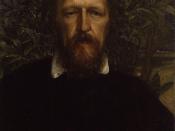The Lotos Flower The Lotos Flower casts a spell on all those that eat it, and it brings them into a dream like world. In the Odyssey, Odysseus and his men eat the lotos and get whisked away to a place like heaven where they are able to reflect on their lives. The poem, "The Lotos-eaters," by Alfred Lord Tennyson goes into Odysseus's and his men's encounters deeper and forces the reader to reflect on their lives. The poem argues whether tranquillity and calmness offer joy verses working for happiness even if you must go through challenges on your way. Throughout the poem the dominant mood of disception is evident. Tennyson uses word choice structure, and figurative language to create this over-all effect on the reader.
Tennyson uses word choice to be deceiving. Throughout the poem the use of "seems" suggests that the heaven that the men are experiencing is fake.
For instance Tennyson writes, "A land where all things seem'd the same!" (Line 24). The men think they are in this great world, but they really aren't. The Lotos land not really a "land of streams,"(Line 10) but a "land of seems." In further clarifying this idea, the author uses seems when he writes, "In the afternoon they came unto a land in which it always seemed afternoon" (lines 3-4). This suggests that it might not actually have been afternoon when they came onto the island. The poet describes the land somewhat different then the sailors describe it. An example of this would be when the poem says, "All day the wind breathes low with mellower tone: thro' every hollow cave and alloy lone" (line112).
This indicates that the vision of the sailor is somehow empty and insubstantial. The crew is being deceived into believing that they are this great place. The sailors make comments that make them sound foolish, and like they are being tricked. The sailors say, "To war with evil," (line 94). When they say this one must ask themselves, are the sailors too lazy to do what is right? By choosing the Lotos land, the mariners are abandoning the sources of the substantial meaning of life. Another way the poet used diction in portraying a mind-altering effect was creating an inverse image of another story. The poet achieves this when he writes, "All things have rest: why should we toil alone,/We only toil" (line46). In this case, the poem not only draws on Homer's, Odyssey, but it also comes from the story of the Garden of Eden that is in the bible. In the Bible, a "life of toil," is Adam's punishment for eating the fruit of the tree of knowledge. Therefore, Tennyson's story is an inverse of the biblical story since the lotos flower is freeing the sailors from toil. By creating this inverse image it suggests that something is not quite right. The crew is being mislead by have a false image of the world that they are in. The diction that the poet chooses helped in creating a tempting and seductive mood.
The way that the poet composes his poem adds to the mind-altering vision that Tennyson has chosen to create. The poet divides the poem into two parts. The first part (lines 1-45) is a descriptive narrative, and the second part (lines 46-173) is a song of eight numbered stanzas. By doing this, the poet shows the transition that the Odysseus and his men go through from reality to an illusory word. The men loose grip of reality and drift away further into deception. Another way Tennyson shows this transition is by using iambic pentameter. From lines (1-45) the pattern is ababbcbcc. As the poem goes on the iambic pentameter gets looser during the choric song. This shows how the lotos alters the sailor's minds as they say longer on the island. The sailors go from their pattern following stressful lives to a carefree world. Also, when reading through that poem, you don't notice that it rhymes on the first read since the poem skips lines in rhyming. The poem it self is deceiving. The sailors are deceived as well as the reader of the poem. The poem is also quite repetitive. The poem repeats it self in the 1st, 5th, and 7th stanzas. The sailors are hypnotized by this illusory world. This shows that Odysseus's men are being misled because they are unaware that they are saying the same things over and over again. As you can see, the structure adds to the mood of the poem.
The poet uses different types of figurative language. Tennyson writes, "Dark faces pale against that rosy flame (line 26). This creating an illusion that the crew's tanned faces are actually pale. Not only is the lotos flower deceiving them, but the world around them is deceiving. The sailors have pictures of the way they think things are in their heads. "A land of streams! Some like a downward smoke." This paints a picture of what the sailors are picturing in their heads. Smoke generally travels upward instead of downward. The way the sailors describe the smoke is probably inaccurate. Lastly, this example of figurative language adds to the speech. "Three silent pinacles of aged snow" (line 16). Snow is not capable of aging. The snow might seem old to the sailors because on the island everything is always the same. Also, nothing else is every mentioned about the crew living in a cold, winter like climate. The sailor's view of the island is misleading because the mixture together of snow and blooming flower is unrealistic.
The diction, figurative language, and structure of the Tennyson's speech help his poem be deceiving. Tennyson is very successful at making his poem deceiving. Not only does the poet make it sound like the sailors are being deceived, but his poem also deceives the reader. The poet forces us to consider the appeal of a life without toil. Even though all of us long for a carefree and relaxed existence few people could really be happy without challenges to overcome with out the fire of aspiration and the struggle to make the world a better place.





